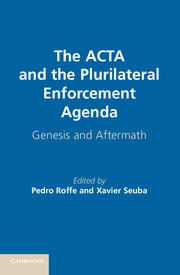Book contents
- Frontmatter
- Contents
- List of Contributors
- Foreword
- Acknowledgments
- Acronyms
- Introduction
- PART I THE FINAL ACT: ITS MAIN FEATURES AND CONTENTS
- PART II DOMESTIC LEGISLATIVE CHALLENGES
- PART III IMPACT ON RELATED PROCESSES
- PART IV VIEWS FROM STAKEHOLDERS: LESSONS
- PART V WHAT LIES AHEAD ACTA
- 21 Assessing the Implications of ACTA for the European Union
- 22 ACTA
- 23 What Was Left Out of ACTA
- 24 Slaying the ACTA Myths
- 25 Developing Countries and the Contestation of ACTA at the TRIPS Council
- 26 ACTA: What Lessons for Future Plurilateral Trade Agreements?
- Annex I Anti-Counterfeiting Trade Agreement
- References
- Index
- References
26 - ACTA: What Lessons for Future Plurilateral Trade Agreements?
Published online by Cambridge University Press: 05 December 2014
- Frontmatter
- Contents
- List of Contributors
- Foreword
- Acknowledgments
- Acronyms
- Introduction
- PART I THE FINAL ACT: ITS MAIN FEATURES AND CONTENTS
- PART II DOMESTIC LEGISLATIVE CHALLENGES
- PART III IMPACT ON RELATED PROCESSES
- PART IV VIEWS FROM STAKEHOLDERS: LESSONS
- PART V WHAT LIES AHEAD ACTA
- 21 Assessing the Implications of ACTA for the European Union
- 22 ACTA
- 23 What Was Left Out of ACTA
- 24 Slaying the ACTA Myths
- 25 Developing Countries and the Contestation of ACTA at the TRIPS Council
- 26 ACTA: What Lessons for Future Plurilateral Trade Agreements?
- Annex I Anti-Counterfeiting Trade Agreement
- References
- Index
- References
Summary
Introduction
The stalemate in the Doha round of multilateral trade negotiations has moved plurilateral agreements, as a means to advance trade liberalisation, to the centre stage of the trade policy agenda. Concrete proposals have been recently made, and initiatives launched, for the negotiation of plurilateral trade agreements in the areas of green goods and services. However, the reflection on plurilateral trade agreements seem to have been insufficiently informed by the experience of the Anti-Counterfeiting Trade Agreement (ACTA).
Yet, ACTA remains the only major plurilateral trade agreement which has been recently negotiated and concluded outside the WTO. It became the subject of a controversial debate. Ultimately, the refusal of the European Parliament, in June 2012, to give its consent compromised its future political viability.
At the WTO and WIPO, developing countries are sometimes perceived as standing in the way of reaching consensual outcomes and concluding new agreements. Yet the fatal blow to ACTA, an agreement mostly among industrialized countries, came primarily from domestic stakeholders in these countries. Against this background, ACTA negotiations offer valuable lessons for the design and negotiation of plurilateral trade agreements. The purpose of this chapter is to identify some of these lessons and to contribute to the broader discussion on plurilaterals in the WTO context.
- Type
- Chapter
- Information
- The ACTA and the Plurilateral Enforcement AgendaGenesis and Aftermath, pp. 376 - 390Publisher: Cambridge University PressPrint publication year: 2014
References
- 1
- Cited by



